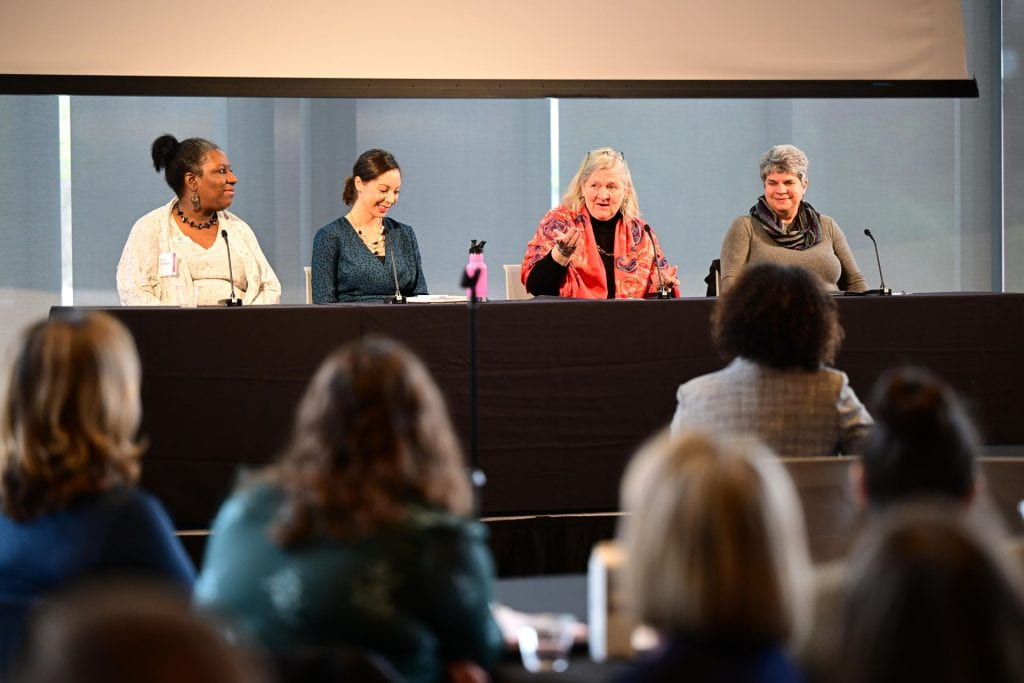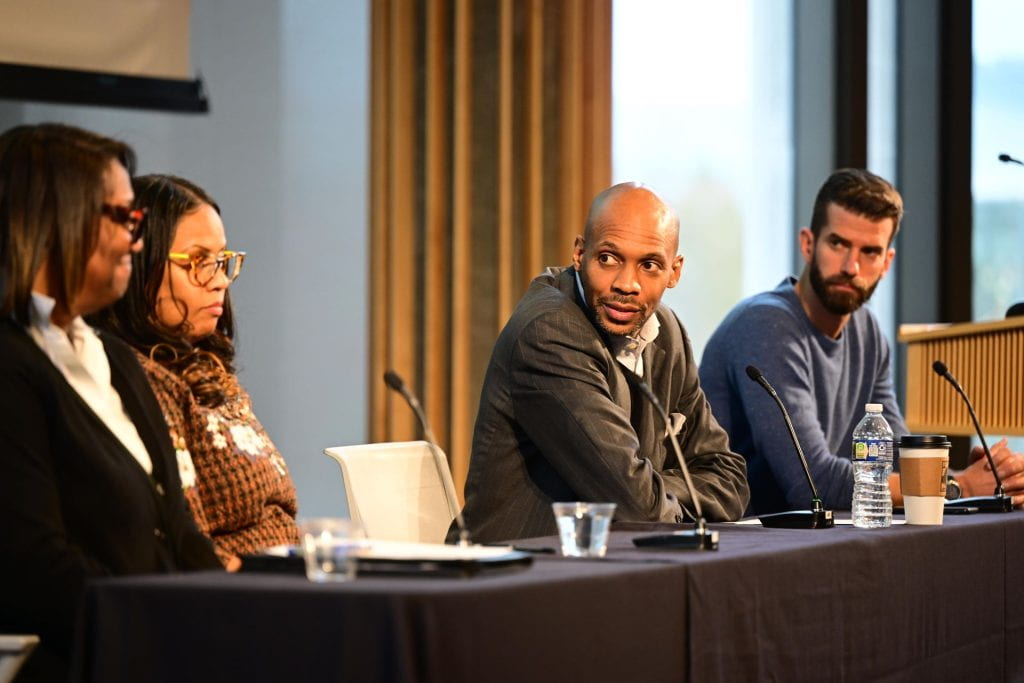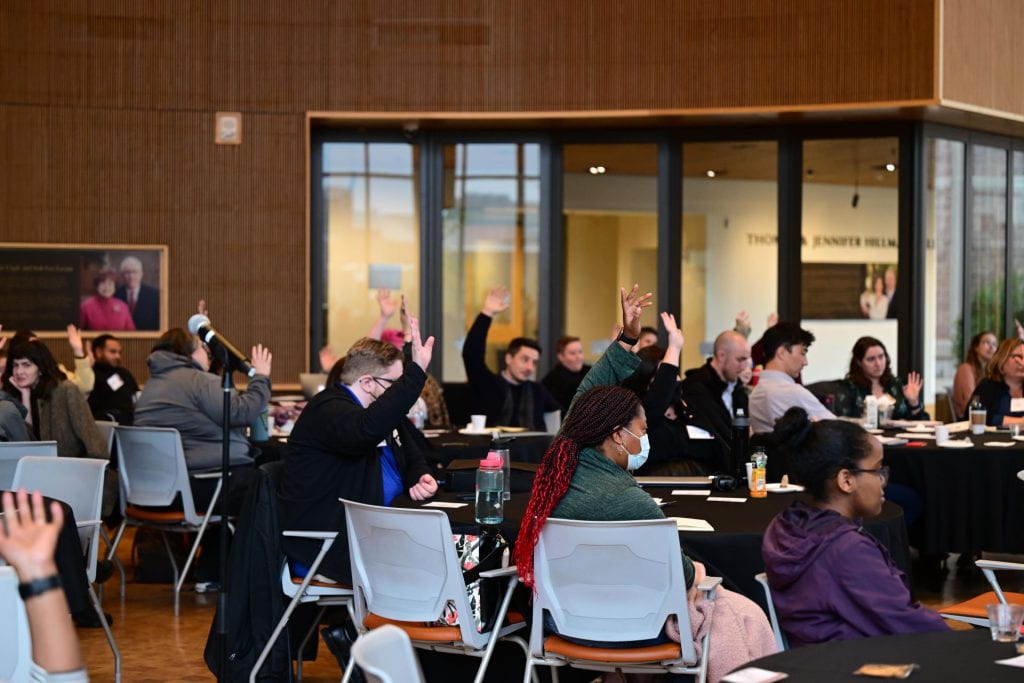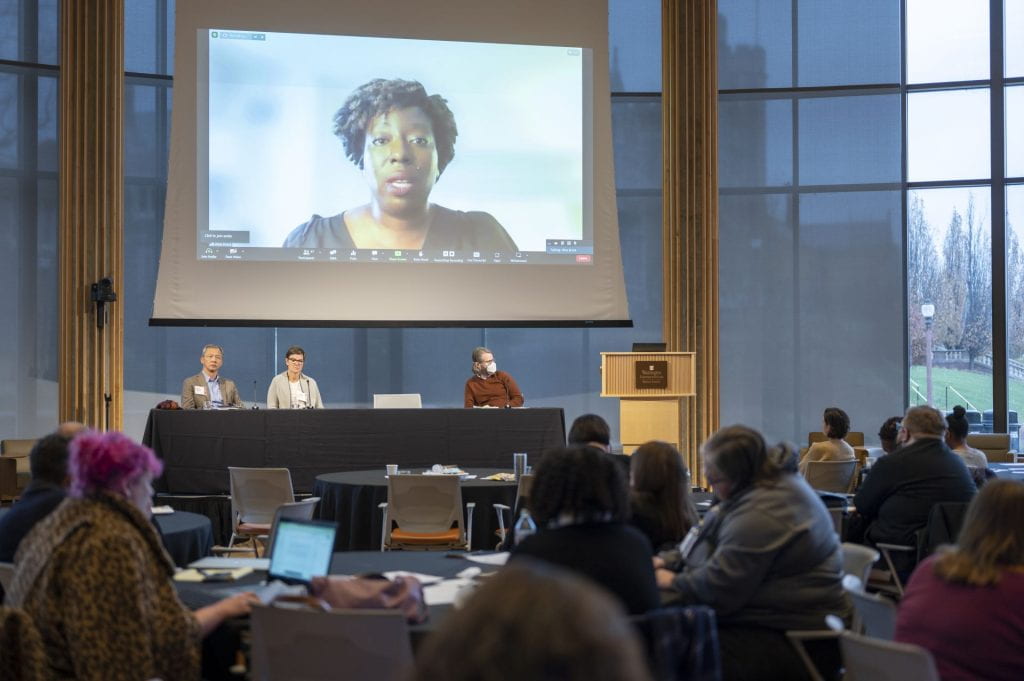In November 2022, the Social Policy Institute at Washington University in St. Louis hosted Data is for Everyone: A Data for Social Impact Summit.
The summit’s goal was to build connection and capacity among social sector organizations to cultivate equitable, community-centered data practices. The event featured 21 local and national speakers across five panels. Each panel sparked dialogue about how to work more collaboratively with data across government, philanthropy, non-profits, and impacted communities. Below are five of our key takeaways.
- Building trust is key.
- Move beyond the hype.
- Bring the right people to the table.
- Data are not neutral.
- Value people over numbers.
1. Building trust is key.
Too often, organizations ask for data before establishing trust with the people the data is from or about. Relationships with partners and the quality of the data they can collect may suffer as a result. In his keynote address, Trooper Sanders of Benefits Data Trust pointed out: “For all the good the social impact sector is doing, we must remember that we’re not entitled to anyone’s trust.” Trust can be built through strong communication and ensuring people represented by the data understand the purpose of the data collection and how it can benefit them.
Erica Williams of A Red Circle shared the frustration often felt by community-based organizations and community members surrounding funding requirements and dynamics: “Communities have been done wrong, and I think over time, between government and people in particular, trust has been eroded,” she said. “So there needs to be some proof, like, ‘put your money where your mouth is’ type-proof. Don’t just say, ‘trust us, we’ll do it,’ but do it and then maybe we’ll trust you.”

Leah Moser of Generate Health highlighted strategies for building meaningful relationships with community, and other partners, that are grounded in trust: “We sat with our grant-funded partners and said, ‘What would success look like to you? What do you want to get out of this experience?’ That’s valuable for us, and I think that goes a long way toward building trust in community.”
2. Move beyond the hype.
While funders and others often tout the importance of data in demonstrating impact, strategies must be tailored to context. Data helpful in one context may present a barrier in another. “We are constantly walking that walk to collect only what we intend to use, and how much is enough, and then also finding methods to level that playing field,” said Cassandra Kaufman of the St. Louis Mental Health Board.
“Sometimes when we come together to talk about the power of data, we lean a little bit too much at times on whatever the flashiest data visualization technology is available,” said Katherine Fritz of Missouri Foundation for Health. “We [funders] are often centering ourselves, and how do we stop doing that? It’s a challenge. We need mentorship about how to go into these conversations in a very humble way and have them be led as much as possible by the communities that are contributing and generating and donating their time and their data to power these discussions.”

This can be particularly challenging when it comes to advanced techniques such as AI or machine learning. Rather than getting caught up in the latest trend, the focus should be on what moves the mission forward while minimizing harm. As Trooper Sanders noted, “We can still be enthusiastic about AI while not buying into the hype. We’re not here to be Silicon Valley. We’re in it to help people as effectively as possible by making smart choices.”
3. Bring the right people to the table.
Working toward social impact requires working across organizations and sectors. It is critical to ensure the right people, and the right data, are involved.
Amen Ra Mashariki of the Bezos Earth Fund discussed data drills as a tool to prepare collaboratives for crisis scenarios: “Let’s take a big problem and let’s work together and see what data each agency has to share with each other, and how we would share what we would share… are there any HIPAA concerns in sharing with each other, and work those out before the emergency so we can at least have a process by which we work together.”
“We know how important data is in informing the decisions that we make on a daily basis,” said Andrea Jackson-Jennings of the St. Louis Regional Response Team (RRT), which created a centralized system to deploy critical resources where they were most needed during the pandemic. This required working with multiple agencies and community partners to facilitate “real-time mapping” and service coordination.

Referencing a data drill the RRT is currently undertaking, Erica Henderson noted that success largely comes down to getting the right people who are willing to roll up their sleeves at the table: “If the real goal is to help and to service people, then how do we make sure that that is what we are actually doing and utilizing the data to help us get there?” she asked. “Who needs to be at the table? Who’s already collecting data? And what data can help inform this long-term strategy of a coordination of resources? That is what is necessary for service delivery.”
4. Data are not neutral.
There are values and biases embedded in every stage of the process of working with data, whether implicit or explicit.
Katherine Fritz addressed the importance of doing “some myth-busting around the power of data to represent an objective truth.” Instead, she noted that “there are many truths” and that data is most powerful when it can illuminate multiple perspectives. Given the inevitable biases involved in data work, she stressed the need to “rethink the power structures that are inherent in the ways that data is collected, analyzed and for what use and for whom.”

Yusef Scoggin, St. Louis City Director of Human Services, connected this point with the need to bring the right people together, as reflected in #3 above: “If you don’t have a group at the table that is informed, you can twist it for whatever your purpose might be.”
5. Value people over numbers.
It is important to not get so caught up in metrics that we forget about the people behind the numbers. “To me, data is kind of tool—it’s useful—but it is not the be-all and end-all,” said Bridget Flood of Incarnate Word Foundation. “We’re really much more concerned with things like the story. We’re concerned with the intangible human elements: commitment to mission, having a vision.”
Simon Huang, Chief Technology Officer for the City of St. Louis, highlighted the drawbacks of focusing too narrowly on what can be counted. “Quantitative data can sometimes mask the story behind what’s occurring,” he said.

Afua Bruce, nonprofit consultant and author of The Tech That Comes Next, echoed this sentiment in the summit’s closing session: “Behind every number is a name, and behind every name is a story, and every story matters.”
You can access the full session recordings and resources shared at the summit here.